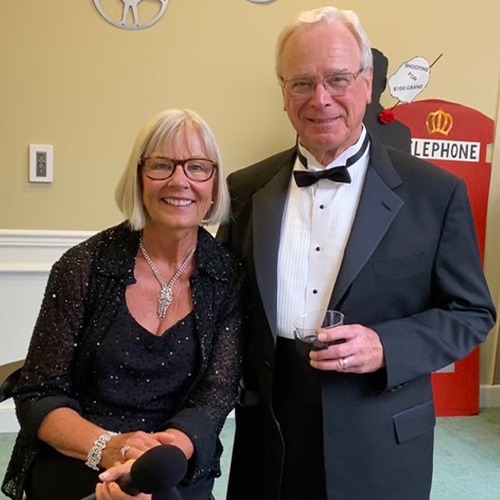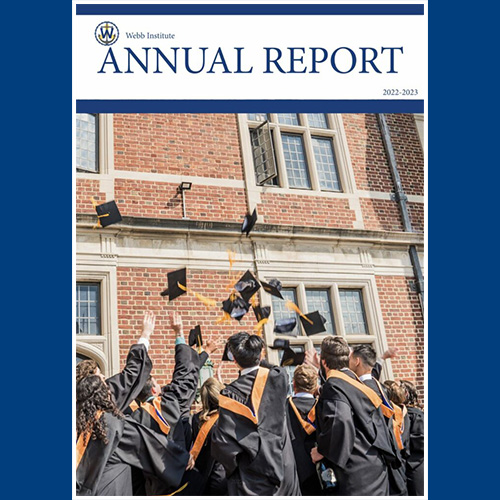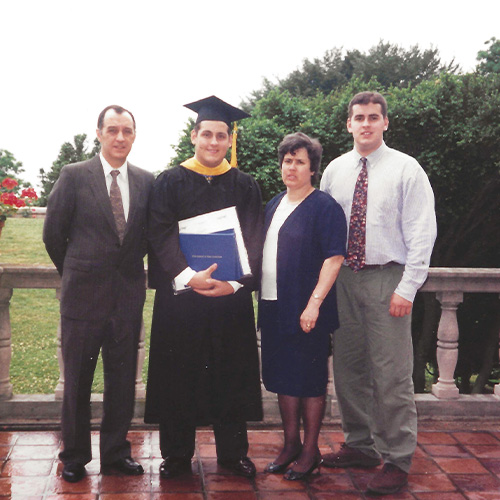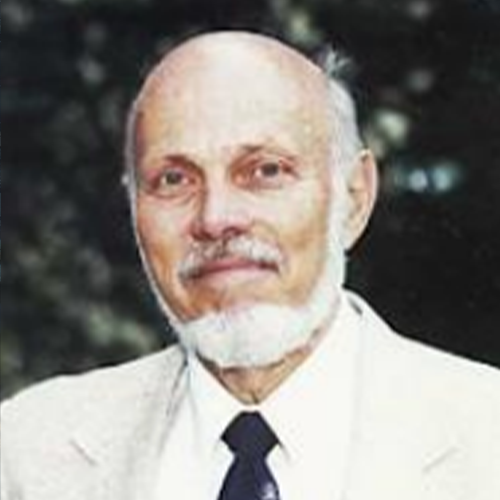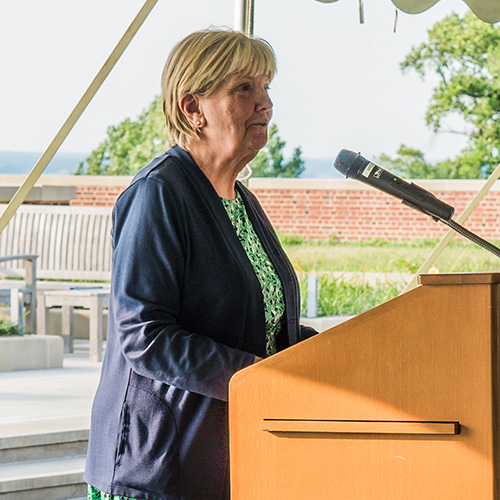Heritage Society Spotlight
by: Dr. Roger H. Compton ’61, PG ’64
Dean Emeritus, Webb Institute
I was introduced to Webb Institute of Naval Architecture quite by accident when I visited our high school guidance counsellor, Mr. Chiles, who was consoling me for not being the primary appointment in my class to attend the U.S. Naval Academy. He handed me a folded piece of paper with an anchor logo on it and said, “you’re interested in boats – you might be interested in this.” Thus began my life-long involvement with Webb.
After an interview with Admiral Haeberle, I was surprised – but delighted – to be offered a position in the Class of 1961 with 20 other young men from all over the U.S. Over the next four years, we bonded as a class, drank beer and ate pizza at Stango’s, struggled through Benny’s math courses and Doc Joe’s chemistry, metallurgy, and thermodynamics courses, and had many tales to tell about our Winter Work experiences. I enjoy telling my friends, who know nothing about Webb’s class size, that I graduated fifth in my class in both high school and college (without explaining that we had almost 600 in my high school class, but only 10 in the Webb Class of 1961)!
My first full-time job after graduation was at Electric Boat (EB) in Groton, CT, during the early days of the U.S. Navy’s Fleet Ballistic Missile (FBM) program. Exciting stuff! After working for a year in the Naval Architecture Department, I applied for a position in the EB Research Department. I was told that I needed more formal education. As it turned out, that was coincident with Webb offering a civilian master’s degree while working part-time in the newly formed Webb Research Department. George Kerr, Webb ’59, classmate Charlie Pieroth, and I were chosen to be in the first class. I was fortunate to have been able to take a couple of courses at Stevens Institute with Dan Savitsky and to be sent to IBM Headquarters in Manhattan to learn FORTRAN. That training allowed me to become the “computer guy” at Webb and to teach a few sessions of programming to Prof. Otto Karst’s junior math students. That experience, along with the superb mentoring of Bob Zubaly (Webb ’55), Norm Hamlin (Webb ‘44B), and Dean Tom Curran (Webb 1925) were instrumental in getting me to apply for a faculty position at the U.S. Naval Academy (USNA). During my 32-year tenure, my colleagues and I were able to establish an ABET-accredited major in naval architecture and build a world-class towing tank. Among the great young midshipmen that I had the pleasure to mentor, was Tom Kiss (USNA ’88), the son of Ron (Webb ’63) and June Kiss (Hon.).
While in Annapolis, I became involved in a very active community theater culture and, in 1981, was cast as Curly in Oklahoma! Guess who was Laurie? Jill and I have been together – and making music – ever since. Jill has made my life complete.
In August of 1998 I retired from USNA to accept the best job on the planet – to be the Dean of Webb Institute, while enjoying the shortest commute on Long Island. Although it was difficult to leave USNA and Annapolis, a dinner with Ron and June Kiss at which we discussed our mutual “adventure in Glen Cove,” sealed the deal for Jill and me. We thoroughly enjoyed our 13-year tenure during which we were able to introduce a small craft design experience with a formal presentation to an invited panel of professionals to juniors (SD 1), and to encourage Webbies – students and staff – to enjoy and participate in musical and theatrical activities. We were most proud of the success of the Webb Family Singers (aka the WooFS) and the two fully staged productions at our 2010 and 2011 Homecomings. After officially retiring in 2011 – the 50th anniversary of my Webb graduation – we were delighted to enjoy an encore year to teach a couple of naval architecture courses to the Classes of 2017 and 2019. From about 2005 until 2019, we enjoyed getting to know incoming freshman classes with the freehand drawing “coursette” offered the week before classes actually started.
In December 2016, we sold our boats and home on Maryland’s Eastern Shore and moved to a retirement community in Vero Beach, Florida. What we found was a town with many opportunities to sing, play water volleyball, and ride our bikes. Our two real boats have been replaced by three remote-controlled model sailboats – fun, but not quite the same as the real thing!
We are happy to be charter members of the Heritage Society when we named Webb the beneficiary of a life insurance policy and named Webb, along with my kids, Dawn, and Brian, to divide up the balance of our estate.
Without a doubt, I owe everything that I accomplished in my professional career to Webb Institute.
Read the 2022-2023 Annual Report!
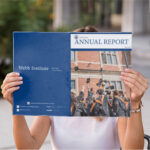 Webb Institute is proud to present our Annual Report for the 2022-23 giving year. This year’s report showcases the invaluable contributions of our alumni, parents, friends, and trustees, whose unwavering support continues to impact both Webb and its students.
Webb Institute is proud to present our Annual Report for the 2022-23 giving year. This year’s report showcases the invaluable contributions of our alumni, parents, friends, and trustees, whose unwavering support continues to impact both Webb and its students.
Your commitment is fundamental to our pursuit of academic excellence and the long-term viability of Webb. The dedication of our supporters is the cornerstone of Webb’s enduring success, and we thank you for continuing this journey with us in our commitment to excellence. Your partnership is not just valued; it is vital. As we look to the future, we are excited to continue this journey with you, building on our shared vision and commitment to excellence.
Click here to read the 2022-2023 Annual Report
Click here for the PDF. version
First-Generation College Graduate to Finance Chair
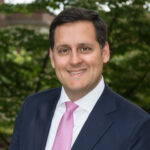 By Paulo Almeida ’95
By Paulo Almeida ’95
Background
I’m a first-generation college graduate and first-generation American from Danbury, CT, which unsurprisingly was recently rated the most diverse (ethnic, religious and socio-economic) city in New England. My parents grew up 15 miles apart in Portugal but met in Danbury, to where many people emigrated from the mountainous parts of Portugal and the Azores. My father moved solo after military service in what was Portuguese Mozambique then a stint in Nashua, NH. My mother’s entire close family immigrated in the mid 60s after earlier generations (including my grandmother who turned 102 a few months ago) returned to Portugal from New Bedford, MA during the Great Depression. Friends who know my roundabout transatlantic family history say it is not a surprise that I wound up in London. Despite being an ocean away, I’m happy to be very close to Webb in several ways.
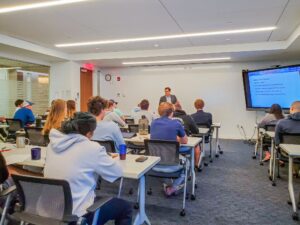
Paulo Almeida ’95 giving a guest lecture at Webb
Value of Hard Work and Education
With essentially all of my interactions until kindergarten being Portuguese-speaking extended family and babysitters – other than a bit of Sesame Street and cartoons – I entered kindergarten with very little English. With the US generally being a great assimilator and probably some long-forgotten hard work from me, I, along with my brother and cousins in the same boat, quickly graduated to English as our first language. My parents came to the US with little more than decent job prospects through family friends, so we all saw the value of both hard work generally and education specifically. My parents invested in Catholic schooling – and lots of Lego – for me and my brother. My parents happily paid for my brother to get his mechanical engineering degree at Rensselear, and would have done the same for me, but surely it was more comfortable all around that I had a full-tuition scholarship at Webb. With socio-economic mobility nowadays not being as strong as it was in the 70s to 90s, and although the US is still far ahead of most of the world, the full-tuition scholarship at Webb is so valuable – even if it is not quite enough to meet the needs of all.
Finding Webb
I only barely remember now but after my parents dissuaded 12-year old me from trying to become a chef or start my own construction company (Thank you again for that!), surely I wanted to be an engineer. I investigated top engineering programs in the Northeast then visited several. Webb was love at first sight. First literally, because of the amazing campus, but also the small tight-knit community. Secondly, the pitch to me from an underclassman that ships are the perfect type of machinery to design because they involve disparate, challenging, interesting topics while at the same time many ships are simple enough that one person could complete the most interesting 80% of the design, leaving the detailed but often less interesting work to others. While this description is probably not 80% true, it is very powerful and I do very regularly repeat it. Unlike many Webbies who were very interested in sailing or military ships, although I was always fond of submarines, it was global commercial shipping that appealed to me. It is the intersection of my loves of applied science, geography and economics. Through yet another circuitous route, this led to me running a portfolio of over 60 ships from London for institutional investors. The practical aspects of the Webb education were big selling points to me. This was primarily winter work, but also field trips. With hard work being so highly valued from a very early age due to my family background, and at one point having wanted to start my own business before I was 20, the practical experience was a big differentiator versus other programs. Winter work also helped build lifelong bonds. I was lucky enough to not only be with Dean Werner twice for winter work but also celebrate his wife’s birthdays then. My favorite field trip was to the Sealand Quality, arranged by fellow Trustee Manny Hontoria. The legendary late Prof. Rowen in his characteristic wit said it could have been called the Sealand High Quality if it only had an MAN B&W engine!
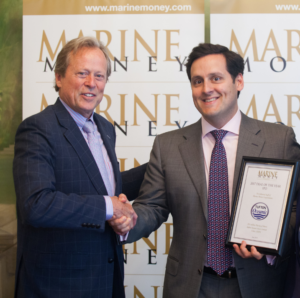
Paulo Almeida ’95 receiving the 2018 Marine Money Deal of the Year Award
Achieving My Goals After Graduation
My Webb education, both in the narrow and broader senses, gave me a strong intellectual foundation, commitment to hard work and confidence that I could then build upon in my career. It prepared me well for being one of the youngest Masters in Finance (“MiF”) students at London Business School in ‘99/’00 and later among the older Chicago Booth executive MBAs in London ‘16-‘18, as well as my time in investment banking and investment management. Towards the end of my MiF, due to reasons familiar at Webb, I pulled an all-nighter after only basic knowledge of a math modelling package to design and price a complex financial derivative that earned an A+. Since completing my MiF, I have worked in high-performing organizations, advising on large corporate deals or equity raisings, bidding on large infrastructure assets and most recently building and running a large portfolio of globally-trading commercial ships with capital raised from very sophisticated investors including large pension funds. My personal background and Webb education gave me the broad and deep technical foundations and confidence to succeed.
Giving Back
Coming back to an earlier point, I’m an ocean away from Webb but am privileged and extremely pleased to be very close in several ways. After all, the traits I brought to and that were reinforced by my Webb education gave me the skills and confidence to facilitate my transatlantic journey and professional evolution. I’ve been lucky enough to be in a position where I can increasingly give back meaningfully financially. Separately, for nearly at least 7 years I’ve been giving a guest lecture to freshmen on buying a ship, making analogies to buying a house while also touching on many of the interesting commercial aspects of the global shipping industry. Other than family celebrations / holidays, this is always one of my favorite days of the year. A few years ago I joined the Webb Board of Trustees, and soon became Finance Chair as a small part of a broader well-planned succession program. We have such a strong, dedicated and increasingly diverse Board. This shows just how important Webb is not only to alumni, but the maritime industry. As John Malone and of course others say about the Heritage Society, it is never too early or too late to give back. I’ve been lucky and very pleased to be able to give back in different ways, and especially hope this helps well-deserving students who also want to give back however they can in the future.
Remembering Dr. Bruce Stephan
The Webb community mourns the passing of Dr. Bruce Stephan, who left us peacefully on December 28, 2023, at the age of 81. A native New Yorker, Dr. Stephan touched generations of Webb students through his 35-year career as a professor of mathematics at Webb Institute. He retired on June 30, 2007, and then became a Faculty Emeritus of Mathematics.
Even after retirement, Dr. Stephan’s love for teaching never dimmed. He taught his own children and grandchildren and tutored many others.
Dr. Stephan was an avid musician as well as a polyglot who was fluent in German and Russian. He loved to travel and explore distant lands with his wife, Jan, and their family. He wanted to ensure that each grandchild experienced his love of travel through carefully planned trips that broadened their horizons.
Rest in peace, Dr. Stephan.
Josie Wilson’s Retirement
Among the hallowed halls of Webb and the Long Island Sound landscape, where memories have been woven over decades, we gathered to bid farewell to one of our most esteemed figures, Josie Wilson, the Director of Academic Services.
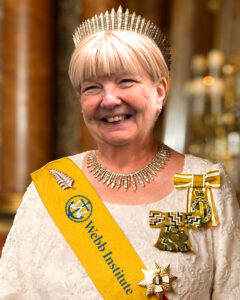
Webb’s very own Queen Josie
Over the years, Josie Wilson has been a beacon of guidance, inspiring countless students with her unwavering dedication and tireless service. As she announces her retirement, marking the onset of a well-deserved new chapter, we come together as a community to celebrate her legacy.
In June of 2023, at her retirement dinner, Josie took the stage to deliver her heartfelt speech. This momentous occasion was preceded by acknowledgments from President Mark Martecchini, and the Dean, Matthew Werner, both of whom honored Josie’s significant contributions and profound impact at Webb. Below, we revisit her touching farewell speech from Homecoming in May of 2023. It was a moment that brought a blend of smiles and tears, a testament to her profound impact.
Farewell, Josie, and may this new journey be filled with the same inspiration and excellence you’ve instilled in all of us.
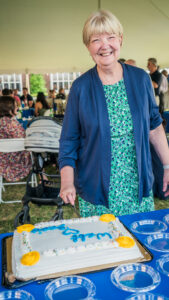
Josie cutting her celebratory cake
“As we all know, Webb Institute is a unique and special place, where students not only receive an excellent education, but also develop lifelong friendships, values, and passions. I have witnessed firsthand how students have grown from their shy first days on campus to confident seniors ready to contribute to the maritime industry.
As I look back on my 33 years here, I cherish the many moments I have shared with the students in the hallways, in my office for a tissue, a hug, or a piece of chocolate, or just to hang out and talk about a recent Winter Work experience or what they will be doing in the summer. You have inspired me and taught me so much too. You have given me joy, laughter, and friendship. You are more than just alumni; you have made me a part of the Webb family, which is truly an honor. The alumni are the reason why Webb Institute is such a wonderful place. And the reason why I am standing here today with a smile on my face and a tear in my eye.
When I was little, I always said when I grow up, I want to be a Mommy. And that dream came true. I was a Mom for many years of about 100 students a year. And I loved every minute of it. And one final thank you to William Webb. It was because of his insight to create such a wonderful, unique college that I have had the most fulfilling career anyone could ever hope for. ”
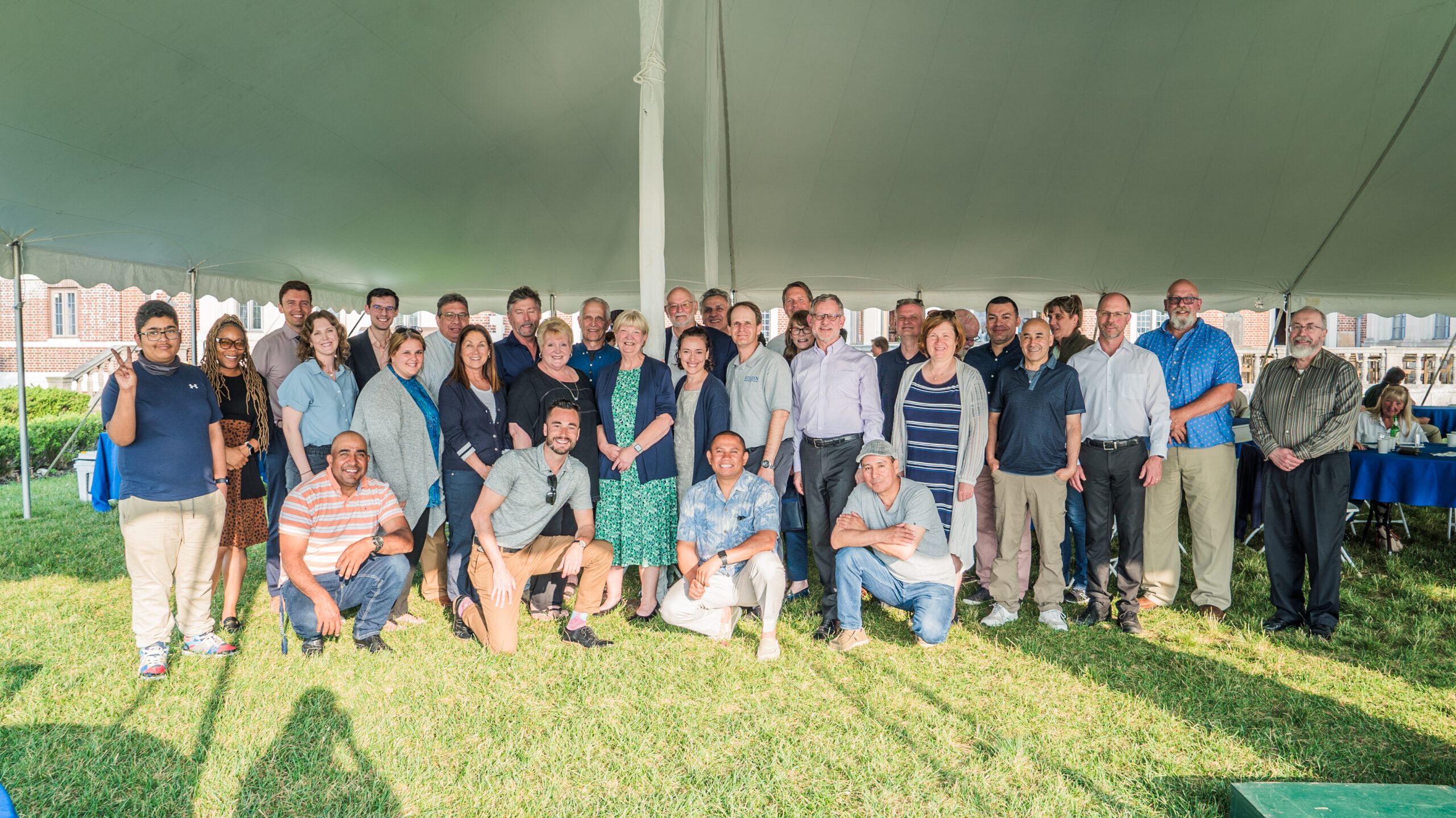
Webb’s administration, faculty, and friends

